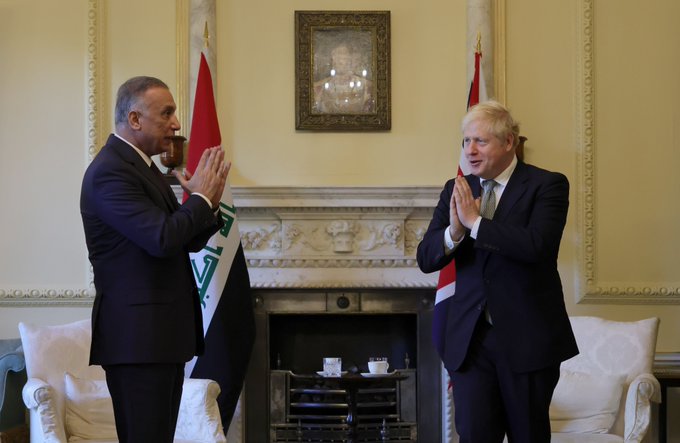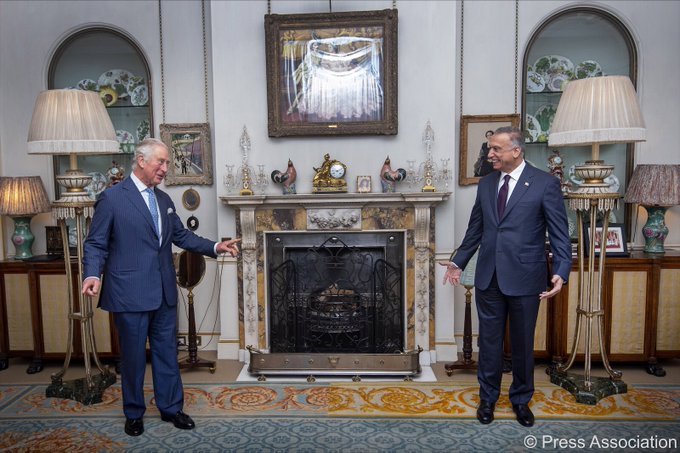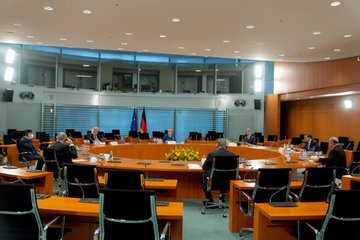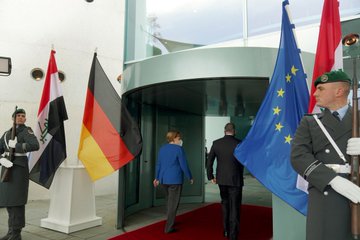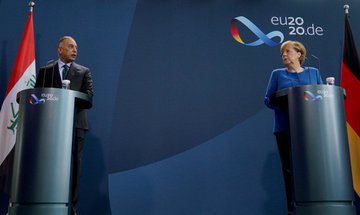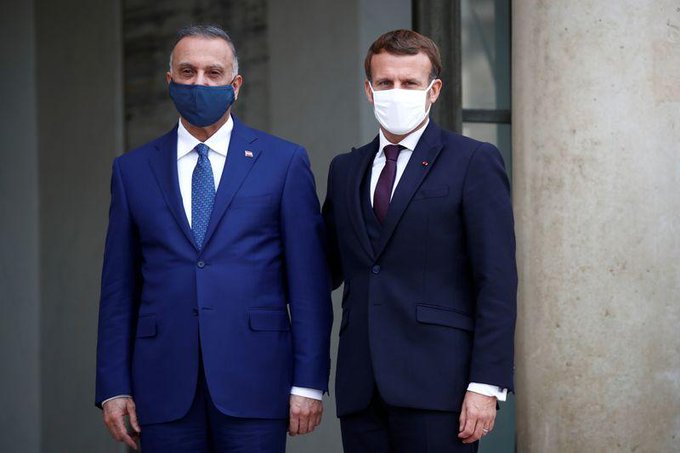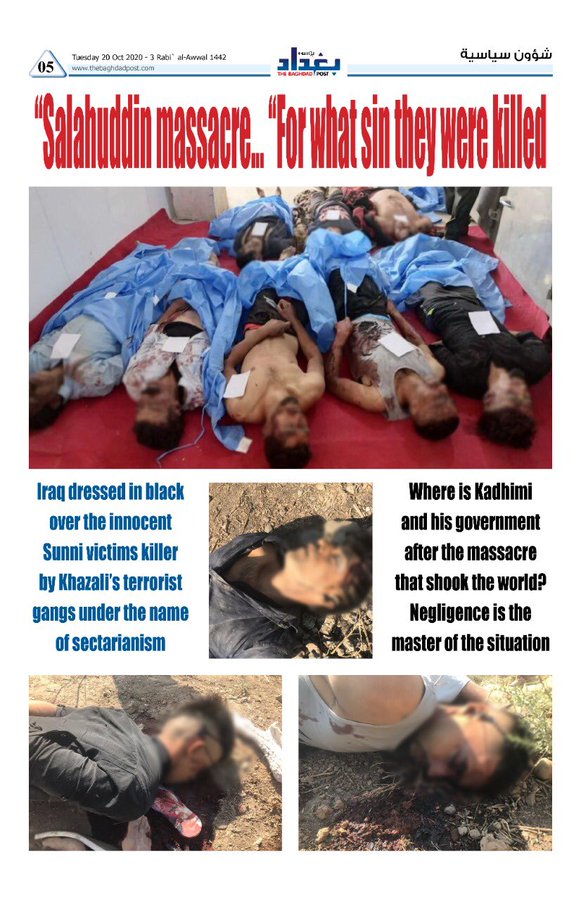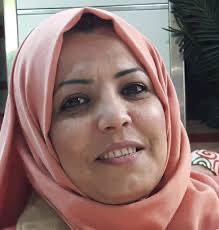Last Saturday, we noted a mass kidnapping in Saladin Province. The kidnapping remains in the news. Dilan Pamuk (ANADOLU AGENCY) reports:
At least eight civilians were abducted and shot dead in Saladin province of Iraq, a human rights body said.
“Armed groups from Hashd al-Shaabi forces abducted 25 civilians on Oct. 17, released 13 of them, killed eight, and the other four are still unheard of,” according to a written statement by Euro-Mediterranean Human Rights Monitor on Thursday.
The bodies of the eight people, including children, were found on an agricultural area with bullet scars on their heads and chests, the statement read. The identities of the civilians killed were also given in the statement.
Local sources said the perpetrators, who were wearing military uniforms and driving vehicles with Hashd al-Shaabi’s emblem, wanted to avenge the killing of one of their militants by [ISIS].
“The bodies left on the agricultural land at 11 o’clock had knife and bullet scars. It was so obvious that they were tortured,” said one of the locals who did not want to be named due to security concerns.
Iraq's Prime Minister Mustafa al-Kadhimi staged a photo-op last Sunday where he vowed justice but then quickly hopped a plane to Europe where he met leaders of Germany, France and the United Kingdom.
Thursday, UK Prime Minister Boris Johnson Tweeted:
The same day Prince Charles of England Tweeted:
Here's a Tweet about him meeting with Germany's Chancellor Angela Merkel:
And MNA Tweeted about Mustafa's meeting with France's President Emmanuel Macron:
Mustafa's trip is over. The outrage over the massacre a week ago remains. The chair of THE BAGHDAD POST, Sufian Samarrai, Tweeted the following in response to the Tweet from Prince Charles:
On the topic of the militias, Martin Chulov (GUARIDAN) reports of how they are preventing Sunni residents of Mosul from returning home:
In some cases, whole communities have been forbidden from traveling home; in others, the consolidation of militia groups, under the banner of the Popular Mobilisation Units, has proved too big a barrier.
“They are Iranian loyalists,” said Taha Saber Saleh, who has spent the past four years in a tent outside the ruined town of Hassan Sham in Iraqi Kurdistan. “Iraq will not be united again until Iranian groups leave the country.”
In the nearby Debaga camp, Saddam al-Zunaidi, from the town of Ba’aj, between Mosul and the Syrian border, said he would never go home. “The militias have taken my home, and they are not allowing a single person back,” he said. “This is a strategic area for them. Ba’aj for me is finished.”
Baghdad seems unwilling to confront what to do about Iraq’s huge numbers of displaced people, and the implications of nearly all of them hailing from the same vanquished sect. “Let that wait for another time,” said one senior minister, who did not want to be named. “The country needs to be put back together slowly. Isis caused much chaos.”
Aid organisations and humanitarian groups, however, say that delays in finding solutions could create new and permanent faultlines in Iraqi society.
“This failure to assimilate mostly Arab, almost all Sunnis, is going to have devastating long-term implications,” said Belkis Wille, a senior crisis and conflict researcher at Human Rights Watch. “It’s building more anger and resentment in a country that seems willing to carry out collective punishment and punish women and children who did not commit crimes.
“Since the battles against Isis wrapped up, and the areas that were formerly under their control have returned to the control of the Iraqi government, very little has been done to foster reconciliation. Instead, the government has focused on things like prosecutions, that are tailored to meting out state revenge to anyone who may have helped or supported Isis in any way.
“For the last four years, this lack of prioritising reconciliation has meant that thousands of predominantly female-headed households, with young children and teenagers, have been unable to return home, and have been excluded from every state structure. These children already missed three years of school under Isis and have now spent several more years unable to enter the classroom, because authorities are refusing to issue them birth certificates.
“They have no access to hospitals, or forms of basic assistance that all Iraqis have. Without documentation, or security clearance, they are prevented from entering any government building, including a courthouse to seek judicial remedy if their home is being occupied.”
The prime minister of the Kurdish regional government, Masrour Barzani, said: “We are very concerned about the failures here. Unfortunately, Baghdad has not taken any responsibility to take care of these people. This costs us $1.5bn a year and Iraq has not contributed. There has to be a way to deal with this. Giving the people a decent life for as long as they stay in the camps is one thing, but finding a future that safeguards us all is just as important.”
In a press release issued October 23rd by the UK government's Foreign, Commonwealth & Development Office, the following was noted regarding the militias, "Recent militia attacks in Baghdad and Erbil have endangered both Iraqi citizens and diplomatic personnel. The UK is working with the Iraqi Government to strengthen security measures, so that Iraqi citizens and foreign personnel can live and work safely."
Staying with government statements, the US Treasury Dept issued the following Thursday:
Washington – Today, the U.S. Department of the Treasury’s Office of Foreign Assets Control (OFAC) is designating Iraj Masjedi, a general in Iran’s Islamic Revolutionary Guard Corps-Qods Force (IRGC-QF) and Iran’s Ambassador to Iraq, for acting for or on behalf of the IRGC-QF. A close adviser to former IRGC-QF Commander Qassem Soleimani, Masjedi played a formative role in the IRGC-QF’s Iraq policy. In his decades of service with the group, Masjedi has overseen a program of training and support to Iraqi militia groups, and he has directed or supported groups that are responsible for attacks that have killed and wounded U.S. and coalition forces in Iraq. In his current capacity, Masjedi has exploited his position as the Iranian regime’s ambassador in Iraq to obfuscate financial transfers conducted for the benefit of the IRGC-QF.
“The Iranian regime threatens Iraq’s security and sovereignty by appointing IRGC-QF officials as ambassadors in the region to carry out their destabilizing foreign agenda,” said Secretary Steven T. Mnuchin. “The United States will continue to employ the tools and authorities at its disposal to target the Iranian regime and IRGC-QF officials that attempt to meddle in the affairs of sovereign nations, including any attempts to influence U.S. elections.”
Masjedi is being designated pursuant to the counterterrorism authority Executive Order (E.O.) 13224, as amended, for acting or purporting to act for or on behalf of, directly or indirectly, the IRGC-QF. The IRGC-QF was designated pursuant to E.O. 13224 in 2007 for support to numerous terrorist groups. The IRGC, including its external arm, the IRGC-QF, was designated as a Foreign Terrorist Organization on April 8, 2019.
A Long-Running Threat to Iraqi Security
Iran’s ambassador to Iraq since 2017, Masjedi has publicly admitted the IRGC-QF’s role in special operations and the training of militia groups in Iraq, Syria, and beyond. He claims credit for organizing and supporting regional militias to advance Iran’s interests throughout the Middle East an enterprise that has spawned untold destruction and corruption, robbing Iraq of a stable, prosperous future.
Masjedi has facilitated financial transfers for the benefit of the IRGC-QF in coordination with IRGC-QF financial facilitator Hushang Allahdad, acting at the direction of former IRGC-QF Commander Soleimani and his successor, Esma’il Ghani. Soleimani was designated pursuant to multiple authorities, including E.O. 13224, in 2011, while Allahdad and Ghani were designated pursuant to E.O. 13224 in 2010 and 2012, respectively. Since 2018, Masjedi has helped the IRGC-QF obtain foreign currency in Iraq, in return for equivalent sums that the IRGC-QF in Iran has transferred to relevant entities. Most recently, Masjedi has provided direct assistance in obtaining tens of billions of dinars on behalf of the IRGC-QF in Iraq.
In the decades prior to his ambassadorial appointment, Masjedi was a senior figure overseeing IRGC-QF activities in Iraq, which included attacks targeting U.S. and coalition personnel, as well as kidnappings and the assassination of Iraqi provincial officials who sought to curb Iranian influence in Iraq. The IRGC-QF provided training for Iraqi recruits, often inside Iran. The Iraqi recruits hailed from groups loyal to, and supported by, the IRGC-QF, which help maintain Iranian influence in Iraqi politics and security. The IRGC-QF also manufactured and distributed weapons, including explosively formed penetrators, that killed and wounded hundreds during Operation Iraqi Freedom.
Masjedi is being designated pursuant to E.O. 13224, as amended, for acting or purporting to act for or on behalf of, directly or indirectly, the IRGC-QF.
SANCTIONS IMPLICATIONS
All property and interests in property of the individual designated today, subject to U.S. jurisdiction, are blocked, and U.S persons are generally prohibited from engaging in transactions with him or the blocked property. In addition, foreign financial institutions that knowingly facilitate significant transactions for, or persons that provide material or certain other support to, the individual designated today risk exposure to sanctions that could sever their access to the U.S. financial system or block their property and interests in property under U.S. jurisdiction.
View identifying information on the individual designated today.
The government of Iran has already responded. Syed Zafar Mehdi (ANADOLU AGENCY) reports:
Iran on Friday designated the US envoy to Iraq and other US officials in the country for “terrorist acts” against Iranian interests, a day after the US government sanctioned Iranian envoy to Baghdad.
Iran’s Foreign Ministry in a statement said the US ambassador to Baghdad Matthew Tueller, US deputy chief of mission in Baghdad Steven Fagin, and US consul general in Erbil Rob Waller had been sanctioned for “effectively organizing, financing, directing, and committing terrorist acts” against Iran.
The ministry said it is taking the action as per “clause 1 of Article 4 and clause 1 of Article 5 of the ‘law on countering human rights violations and terrorist acts of the United States’” approved by the Iranian parliament on August 22, 2016.
PRENSA LATINA notes, "[Iran's Foreign Ministry spokesperson Said] Jatibzade's statement responds to the US Treasury Department that sanctioned the Iranian ambassador to Iraq and five other Iranian entities for alleged attempts to intervene in the US presidential elections."
The people of Iraq remain under threat. The people include the journalists. Dropping back to the September 24th snapshot about what took place, less reported, while Iraqi president Salih Barham spoke to the United Nations:
The western press loves Salih. He's trying to thwart upcoming elections, he's corrupt and so much more, but they love him. Especially in the US, they love Salih. He's not the saint they portray him as. The Committee To Protect Journalists issued the following yesterday:
New York, September 23, 2020 – Kurdish authorities in Iraq should immediately release journalist Bahroz Jaafer, drop all charges against him, and allow the press to cover and write critically about politicians without fear of detention or legal action, the Committee to Protect Journalists said today.
Yesterday, police arrested Jaafer, a columnist for the independent news website Peyser Press, in the northeastern Iraqi Kurdish city of Sulaymaniyah and transferred him to the Azmar police station, where he remains in detention, according to news reports and a statement by the Metro Center for Journalists’ Rights and Advocacy, a local press freedom group.
Authorities charged Jaafer with criminal defamation, according to the Metro Center. If tried and convicted under Article 433 of Iraq’s penal code, Jaafer could face up to one year in jail and a fine of up to 100 dinars (about 8 US cents).
The arrest was sparked by a defamation complaint filed by the lawyer of Iraqi President Barham Salih, in response to a column by Jaafer criticizing the president, according to those reports.
“Iraqi authorities should develop a thicker skin and stop resorting to the criminal code to stifle critical reporting and commentary,” said CPJ’s Middle East and North Africa representative, Ignacio Miguel Delgado. “Iraqi President Salih should immediately drop the defamation complaint against journalist Bahroz Jaafer, and local authorities should release him unconditionally.”
On August 29, Jaafer published a column titled “How much longer will the president be driving the wrong side?” in which he criticized Salih, also an ethnic Kurd, for allegedly failing to support Iraqi Kurdistan amid disputes with the national government over land, oil, and the autonomous region’s budget.
Karwan Anwar, head of the Sulaymaniyah branch of the government-funded Kurdistan Journalists’ Syndicate, told local broadcaster Rudaw that Jaafer, a member of the syndicate, is required to remain in detention until a hearing scheduled for September 30, unless he is granted bail beforehand.
The Iraqi president’s media office did not immediately reply to CPJ’s request for comment sent via messaging app. Dindar Zebari, the Kurdish regional government’s coordinator for international advocacy, did not immediately reply to CPJ’s emailed request for comment.
Salih's done nothing to help the Iraqi people -- that includes the Iraqi activists.
Now another reporter is being targeted, Sudad al-Salhy. MIDDLE EAST EYE notes of their correspondent:
An arrest warrant for Middle East Eye journalist Suadad al-Salhy has been issued in Iraq over the charge of “defamation”.
A judge at Tahqiq al-Karada Court issued the warrant on Thursday, requesting Salhy be taken to al-Alawiya police station.
No other details are provided and MEE is seeking more information from the court. According to the Iraqi penal code, Salhy could face up to one year in jail and a fine of 100 Iraqi dinars (US$0.08) if convicted of criminal defamation.
Suadad al-Salhy has reported with THE NEW YORK TIMES, ALJAZEERA, THE ASSOCIATED PRESS and REUTERS. She is an internationally recognized journalist and even that doesn't protect her. Reporters Without Borders notes:
Al-Salhy has learned that she could be arrested at any time as a result of a yesterday’s decision by the Supreme Judicial Council to arrest her under article 433-1 of the Penal Code for defamation, which is punishable by a fine and a year in prison.
The decision was taken just hours after Middle East Eye published a story by Al-Salhy in which she revealed that Iranian Supreme Leader Ali Khamenei ordered Iraq’s pro-Iranian militias to stop attacking US interests last week. The article is sourced and well documented.
“We ask the Iraqi authorities to ensure that Suadad Al-Salhy is not detained and that the judicial proceedings against her are dropped,” said Sabrina Bennoui, the head of RSF’s Middle East desk. “This journalist, who is known for her professionalism, just did her job. Revealing information, even sensitive information that annoys some people, is fundamental principle of the freedom to inform.”
This is not the first time Al-Salhy has had exclusives on very risky subjects in Iraq. In August, for example, she revealed that a former adviser to Abu Mahdi Al-Muhandis – the co-founder of Iraq’s Hezbollah Brigades who was killed in a targeted US drone strike in January 2020 that also killed Iranian Revolutionary Guards commander Qassem Soleimani – accused the current prime minister, Mustafa Al-Kadhimi, of plotting to killed Muhandis several times in the past.
Al-Salhy has herself received threats in the past. She escaped a murder attempt by unidentified gunmen in 2007 and explosive devices were found outside her parent’s home in 2014.
Iraq is ranked 162nd out of 180 countries in RSF's 2020 World Press Freedom Index.
The Committee To Protect Journalists issued the following:
New York, October 23, 2020 – Iraqi authorities should drop the arrest warrant issued for journalist Suadad al-Salhy and allow the press to work freely, the Committee to Protect Journalists said today.
Yesterday, a judge at the Al-Karrada Investigative Court in Baghdad issued an arrest warrant for al-Salhy, a reporter for the Middle East Eye news website, on charges of defamation under Article 433 of the Iraqi Penal Code, according to the warrant, which CPJ reviewed, and a report by her employer. As of this afternoon, she was not in custody, according to a source who asked not to be named for fear of reprisal.
“The warrant for Suadad Al-Salhy’s arrest is a sad reminder that Iraqi journalists are facing constant threats of government harassment and obstruction,” said CPJ Middle East and North Africa representative Ignacio Miguel Delgado. “Press freedom entails allowing coverage of events of public interest and a wide range of viewpoints. Iraqi authorities should immediately drop the arrest warrant for al-Salhy and allow her to do her job freely and without fear of reprisal.”
The arrest warrant demands al-Salhy be taken to the Al-Alawiya police station, but does not say what actions prompted the order. If convicted of criminal defamation, al-Salhy could face up to one year in jail and a fine of 100 Iraqi dinars (US$0.08), according to the Iraqi penal code.
Al-Salhy has covered many sensitive issues in Iraq, including the role of militias, the country’s relations with Iran, and anti-government protests. She has contributed to international media outlets including Reuters, Al-Jazeera, and The New York Times.
Suadad's work has been important throughout the ongoing war. She's often reported on issues others have ignored such as in November 2013 when Suadad al-Salhy and Isabel Coles (REUTERS) reported:
Domestic abuse and prostitution have increased, illiteracy has soared and thousands of women have been left widowed and vulnerable. Many women also rue the political leaders that came to power after Saddam was overthrown and the growing social conservatism that has diminished their role in public life.
Once at the vanguard of women's rights in the region, Iraq ranked 21st out of 22 Arab states in a poll of 336 gender experts released on Tuesday by Thomson Reuters Foundation (poll2013.trust.org).
She also covered the meat and potatoes issues such as in 2008 when Suadad and Katherine Zoepf (NEW YORK TIMES) reported the price of oil per barrel going up and slightly down has Iraq's concerned about their budget for next year and have cut it by $13 billion dollars. We've long noted her work at this site, for over a decade now. She's one of the reporters who've remained covering Iraq by changing outlets -- Liz Sly and Jane Arraf would be two others. I'm going to assume that they and the many reporters she's worked with in the past -- Ned Parker, among them -- will be at least offering a Tweet in support of her. Ned certainly knows what it's like to be targeted by the government of Iraq, for example. At present, there are two Tweets only.
The Iraqi Observatory for Human Rights Tweets:
Arwa Ibrahim also Tweeted about Suadad:
The arrest warrant issued for Iraqi journalist Suadad al-Salhi came shortly after she published a piece saying Iran’s Khamenei had ordered and end to Iraqi attacks on US interests.
The following sites updated:


